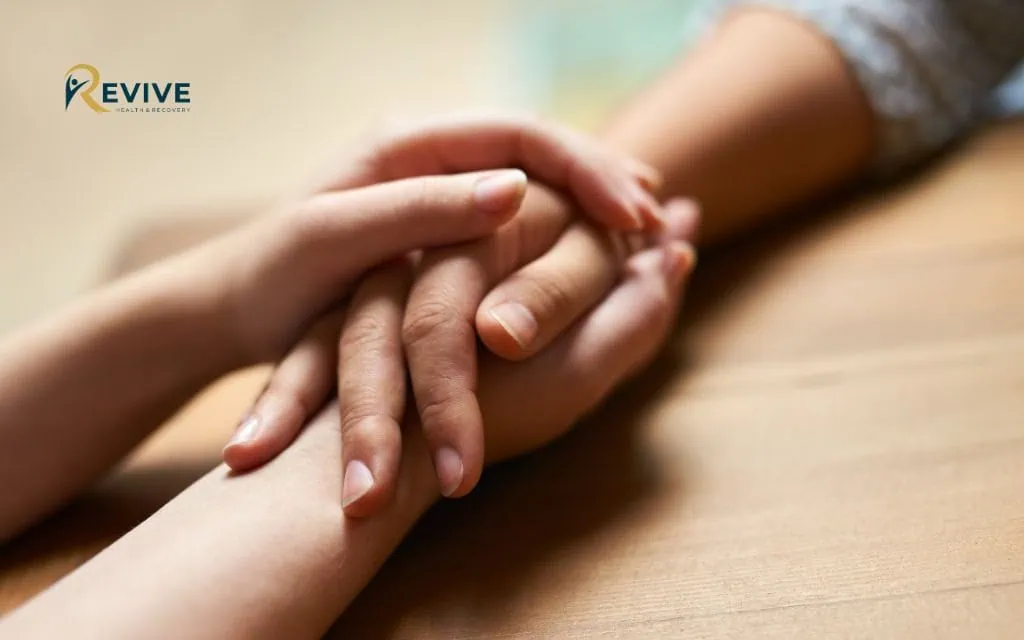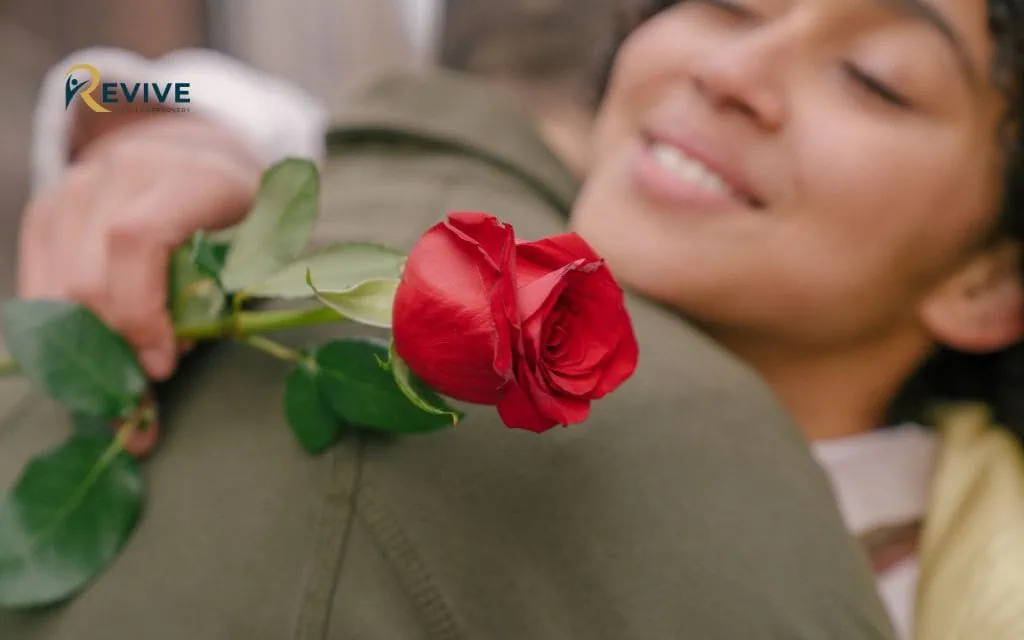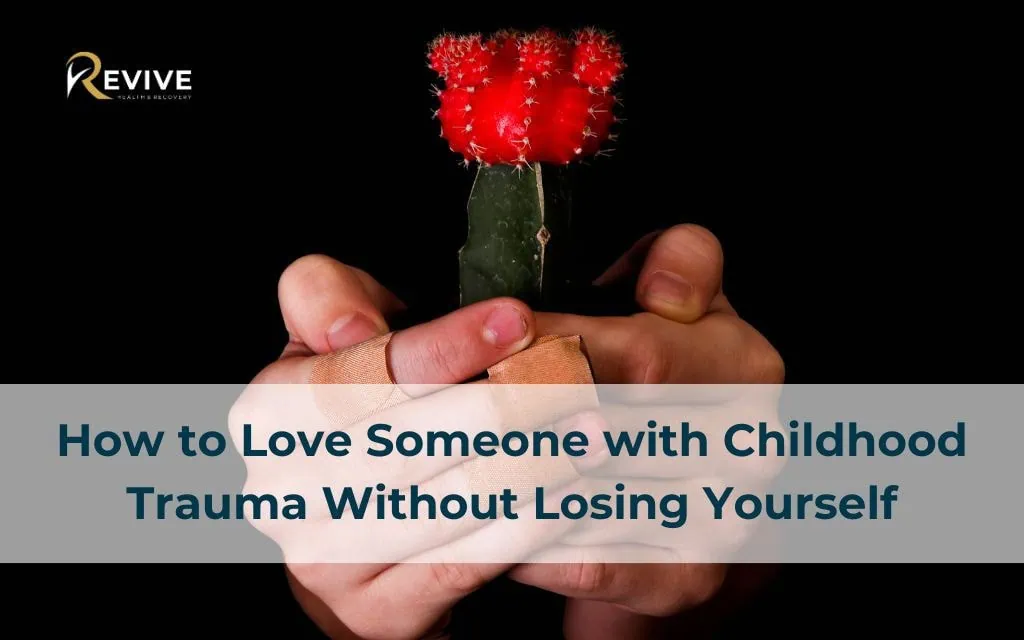Discovering how to love someone with childhood trauma requires patience, understanding, and specialized knowledge. For residents of Denver and throughout Colorado, navigating relationships affected by early traumatic experiences presents unique challenges and opportunities. At Revive Health Recovery, we understand that loving someone who carries the invisible wounds of childhood can be both deeply rewarding and exceptionally challenging.
If you’re struggling to connect with a partner affected by childhood trauma, know that you’re not alone. Nearly 15% of Colorado adults have experienced four or more Adverse Childhood Experiences (ACEs), creating ripple effects that touch their adult relationships in profound ways. Understanding these dynamics is the first step toward building a healthier connection.
Have questions about supporting a partner with trauma? Our specialists at Revive Health Recovery are here to help. Call us today at (303) 268-4655.
Understanding Childhood Trauma and Its Impact on Relationships
What Defines Childhood Trauma and How Common Is It in Colorado?
Childhood trauma refers to adverse experiences before age 18 that overwhelm a child’s ability to cope effectively. These experiences can include physical, emotional, or sexual abuse, neglect, household dysfunction, witnessing violence, or experiencing significant loss. The effects don’t simply disappear with adulthood – they often reshape how individuals form and maintain relationships.
In Colorado specifically, childhood trauma rates reflect concerning patterns. Beyond the 15% of adults who experienced four or more ACEs, many more live with the effects of at least some form of childhood adversity. Denver’s growing population includes many transplants seeking fresh starts after difficult pasts, yet these early experiences often travel with them, influencing their capacity for intimacy and trust.
When childhood trauma occurs, it fundamentally affects brain development, creating protective survival mechanisms that can persist for decades. The brain learns to prioritize safety above all else, which can complicate adult relationships in ways that might seem confusing without this context.
How Childhood Trauma Manifests in Adult Relationships
Understanding how to love someone with childhood trauma begins with recognizing how these early experiences influence relationship patterns. For those navigating the complexities of dating a partner with such experiences, specialized strategies can make a significant difference.
Trauma responses-including fight, flight, freeze, and fawn reactions-don’t disappear in adulthood but often emerge during moments of relational stress or perceived threat. Childhood trauma often shapes romantic relationships in profound ways, creating unique challenges and opportunities for growth

Common manifestations include:
- Trust difficulties: Past betrayals by caregivers can make trusting partners extremely challenging
- Emotional regulation challenges: Survivors may experience intense emotional responses that seem disproportionate
- Attachment insecurity: Trauma can disrupt healthy attachment styles, creating anxious or avoidant patterns
- Boundary confusion: Understanding appropriate boundaries may be difficult for someone who experienced boundary violations in childhood
- Mistaking intensity for intimacy: Trauma survivors often confuse emotional intensity with genuine connection
Denver’s high altitude may uniquely affect mental health symptoms and trauma responses due to oxygen levels, sometimes intensifying anxiety responses that accompany trauma triggers. This environmental factor creates additional considerations for trauma recovery in our region.
At Revive Health Recovery, we specialize in trauma-informed treatment approaches that address these complex dynamics. Reach out today at (303) 268-4655 to learn how we can support your relationship healing journey.
Building a Foundation for Healing Together
Creating Safety in Your Relationship
Emotional safety forms the cornerstone of loving someone with childhood trauma. Without it, healing remains elusive, and connection becomes temporary at best. Creating safety requires consistent, predictable patterns that reassure the trauma-affected brain that danger isn’t imminent.
For a deeper understanding of how trauma affects a person’s sense of safety, see this resource.
Consider implementing these trauma-informed approaches:
- Maintain consistency in how you respond to emotional needs
- Follow through on commitments, even small ones
- Communicate changes to plans or expectations clearly and early
- Validate feelings without judgment
- Practice transparency about your own emotions and needs
“Safety isn’t just the absence of threat – it’s the presence of genuine connection,” explains our trauma specialists at Revive Health Recovery. “This foundation makes all other relationship growth possible.”
Colorado’s unique geography offers natural healing opportunities through outdoor experiences. Many trauma survivors find that Denver’s proximity to nature provides valuable grounding experiences that complement therapeutic work. Incorporating visits to local parks or mountain trails can support your relationship’s healing journey.
Navigating Triggers and Trauma Responses
Learning how to love someone with childhood trauma necessarily involves understanding triggers—stimuli that activate the trauma response system. These triggers might include specific words, tones of voice, physical sensations, or situations that unconsciously remind your partner of past trauma.
When triggered, your partner might:
- Become withdrawn or shut down (freeze)
- Respond with irritability or anger (fight)
- Need physical or emotional distance (flight)
- Become people-pleasing, ignoring their own needs (fawn)
Managing triggers in trauma-affected relationships requires patience and specific skills:
- Work together to identify common triggers
- Create a safety plan for triggered moments
- Learn grounding techniques that help restore calm
- Practice nervous system regulation together
- Respect when space is needed without taking it personally
Denver-specific triggers might involve crowded urban spaces, altitude-related physical sensations that mimic anxiety, or the transient nature of Denver’s population that can activate abandonment fears.
For personalized guidance on managing trauma triggers in your relationship, contact our specialists at Revive Health Recovery at (303) 268-4655.
Practical Skills for Supporting Your Partner
Trauma-Informed Communication Approaches
How we communicate can either heal or unknowingly retraumatize. When learning how to love someone with childhood trauma, developing trauma-informed communication skills becomes essential for both partners.
Learning effective ways to support a partner with childhood trauma can significantly enhance your relationship’s healing process.
Effective approaches include:
- Active listening: Give full attention without planning your response
- Validate experiences: Acknowledge feelings as real without judgment
- Use “I” statements: Express your needs without blame (“I feel worried when…” instead of “You always make me worry…”)
- Offer choice: Provide options rather than demands
- Check understanding: Confirm you’ve understood correctly before responding
- Be patient with silence: Allow processing time without rushing to fill gaps
Colorado’s distinctive trauma therapy approach incorporates mindfulness practices that enhance communication. These techniques, which leverage our region’s focus on present-moment awareness, can strengthen trauma-informed communication between partners.
Setting Healthy Boundaries While Showing Support
Perhaps counterintuitively, clear boundaries actually create safety for trauma survivors. Without boundaries, relationships can become enmeshed, retriggering old patterns of dysfunction.
Healthy boundary-setting includes:
- Clearly expressing your needs and limits
- Respecting your partner’s boundaries without taking them personally
- Distinguishing between supporting and rescuing
- Maintaining your own identity and interests
- Recognizing when professional support is needed
“Learning how to love someone with childhood trauma means finding the balance between compassionate support and self-care,” notes our relationship specialists at Revive Health Recovery. “Neither sacrificing yourself nor maintaining rigid distance will create the conditions for healing.”

Need guidance on setting healthy boundaries while supporting your partner? Our team at Revive Health Recovery specializes in trauma-informed relationship support. Call (303) 268-4655 today.
Finding Support in Denver’s Therapeutic Community
Denver’s Specialized Trauma Therapy Resources
Denver has emerged as a hub for innovative trauma treatment approaches. The city offers specialized trauma-informed relationship therapy services that can provide crucial support for couples navigating childhood trauma’s effects.
Key therapeutic modalities available in Denver include:
- EMDR therapy: Eye Movement Desensitization and Reprocessing helps process traumatic memories
- Somatic Experiencing: Addresses trauma stored in the body
- Internal Family Systems (IFS): Works with different “parts” created by trauma
- Brainspotting: Identifies and processes trauma through fixed eye positions
- Trauma-Focused Cognitive Behavioral Therapy: Restructures trauma-related thought patterns
Revive Health Recovery offers comprehensive trauma therapy services incorporating these evidence-based approaches. Our Denver-based specialists understand the unique needs of Colorado residents dealing with childhood trauma in relationships.
Couples Therapy Options for Trauma-Affected Relationships
When learning how to love someone with childhood trauma, specialized couples therapy can provide structured support for both partners. Trauma-informed couples therapy Colorado services focus on creating safety, understanding trauma’s relationship impacts, and developing new patterns together.
Effective couples approaches include:
- Emotionally Focused Therapy (EFT)
- The Gottman Method with trauma adaptations
- Psychobiological Approach to Couple Therapy (PACT)
- Attachment-focused couples work
These approaches recognize that healing happens in relationship—not just individually. By addressing patterns together, both partners can grow in their capacity for connection.
The unique combination of urban services and mountain wilderness access creates specialized opportunities for trauma healing in Colorado relationships. Many local therapists incorporate these environmental advantages into their treatment approaches.
For information about trauma-informed couples therapy at Revive Health Recovery, contact our Denver office at (303) 268-4655.
Self-Care for Partners of Trauma Survivors
Managing Secondary Trauma and Compassion Fatigue
Loving someone with childhood trauma can take an emotional toll. Secondary trauma – sometimes called compassion fatigue – occurs when supporting someone through trauma recovery begins affecting your own emotional well-being.
Signs you might be experiencing secondary trauma include:
- Feeling emotionally exhausted or numb
- Becoming irritable or impatient
- Experiencing intrusive thoughts about your partner’s trauma
- Withdrawing from your own support system
- Physical symptoms like headaches or sleep disturbances
Self-care isn’t selfish! It’s necessary for sustainable support. Consider:
- Setting clear emotional boundaries
- Developing your own support network
- Working with your own therapist
- Practicing regular stress-reduction techniques
- Taking breaks when needed
Denver offers specialized support groups for partners of trauma survivors that can provide validation and practical coping strategies.
Finding Balance in the Colorado Lifestyle
Colorado’s emphasis on outdoor recreation and wellness provides unique opportunities for partners supporting trauma survivors. The state’s natural environment offers powerful resources for maintaining your own well-being while supporting someone through trauma recovery espiecially for ‘How to love someone with childhood trauma’.
Consider incorporating:
- Regular outdoor activities that restore your energy
- Mindfulness practices enhanced by natural settings
- Denver’s abundant wellness resources
- Community connections that prevent isolation
- Colorado’s distinctive trauma therapy approach that incorporates mindfulness practices with outdoor experiences
“Supporting someone through trauma recovery is a marathon, not a sprint,” reminds our team at Revive Health Recovery. “Colorado’s emphasis on balanced living provides valuable resources for this journey.”
For personalized guidance on managing your own well-being while supporting a partner, contact Revive Health Recovery at (303) 268-4655.
Building a Future Together Beyond Trauma
Celebrating Progress and Growth
Learning how to love someone with childhood trauma means recognizing and celebrating healing milestones, no matter how small. Progress in trauma recovery rarely follows a linear path—it involves setbacks alongside breakthroughs.
Consider these ways to acknowledge growth:
- Notice and name positive changes in relationship patterns
- Create new, positive memories together that contrast with trauma narratives
- Recognize improved communication during difficult moments
- Celebrate increased capacity for intimacy and vulnerability
- Acknowledge your growth as a couple
Denver’s vibrant cultural scene offers opportunities to create new shared experiences that strengthen your connection beyond trauma narratives.
Long-Term Vision for Healing Relationships
Healing from childhood trauma takes time—often years—but tremendous growth is possible with consistent support. Couples who navigate this journey together often develop extraordinary relationship skills and emotional depth.

A realistic vision for the future includes:
- Ongoing healing with decreasing symptom intensity
- Development of new relationship patterns that replace trauma-driven ones
- Increased capacity for joy and intimate connection
- Greater resilience during challenging times
- The ability to support others on similar journeys
The building of healthy relationships with trauma survivors Colorado residents experience can be transformative for both partners. With patience, skill development, and appropriate support, trauma-affected relationships can thrive ‘How to love someone with childhood trauma’.
Revive Health Recovery is committed to supporting couples throughout their entire healing journey. Contact us at (303) 268-4655 to discuss long-term relationship support.
FAQs about How To Love Someone With Childhood Trauma
How do I know if my partner’s behaviors are related to childhood trauma?
Signs include strong emotional reactions to seemingly minor triggers, difficulty trusting, patterns of withdrawal during conflict, people-pleasing behaviors, and challenges with intimacy. For professional assessment, Revive Health Recovery offers comprehensive trauma evaluations by specialists who understand these complex dynamics. As Denver’s premier trauma treatment center, we can help you understand the connection between past experiences and current relationship patterns.
Can someone with childhood trauma have healthy intimate relationships?
Absolutely. With appropriate support, understanding, and often therapeutic intervention, trauma survivors can develop secure, fulfilling relationships. Revive Health Recovery has witnessed countless trauma survivors build healthy, intimate connections through our specialized programs in Denver. Our integrated approach addresses both individual healing and relationship dynamics.
What should I do when my partner is triggered and pushing me away?
Respond with calm compassion, give space when needed without abandonment, and avoid taking their reaction personally. Revive Health Recovery teaches specific de-escalation techniques for these moments. Our PTSD relationship help Denver specialists can equip you with personalized strategies that work for your unique situation and relationship dynamics.
How can I support my partner’s healing without becoming their therapist?
Be emotionally available while maintaining appropriate boundaries, encourage professional support, and focus on creating safety rather than “fixing” the trauma. Revive Health Recovery offers partner support programs that clarify these boundaries while teaching effective support skills. As Colorado’s leading trauma-informed care provider, we help partners find this crucial balance.
What Denver-area resources are available for couples affected by childhood trauma?
Revive Health Recovery offers comprehensive trauma-informed couples therapy, specialized groups for partners, and individual trauma treatment. Our Denver center integrates cutting-edge approaches including EMDR, Somatic Experiencing, and IFS with compassionate relationship support. As the premier resource for trauma recovery in Colorado, we provide comprehensive care under one roof.
5 Reasons to Choose Revive Health Recovery for Trauma Support
When learning how to love someone with childhood trauma, having the right professional support makes all the difference. Here’s why Revive Health Recovery stands apart as Denver’s premier trauma treatment center:
- Specialized Trauma Expertise: Our clinical team has advanced training in multiple evidence-based trauma therapies including EMDR, Somatic Experiencing, IFS, and Brainspotting—all essential modalities for childhood trauma recovery.
- Relationship-Focused Approach: Unlike centers that treat only individuals, we recognize trauma happens in relationships and heals in relationships. Our programs actively include partners in the healing journey.
- Colorado-Specific Methodology: We integrate Denver’s unique environmental advantages—including access to nature and mindfulness practices—into our treatment approaches.
- Comprehensive Care Model: From individual therapy to couples work to group support, we provide all services under one roof, creating seamless care coordination.
- Proven Results: Our clients report significant improvements in relationship satisfaction, trauma symptom reduction, and overall quality of life after participating in our programs.
If you’re navigating the challenges of loving someone with childhood trauma, you don’t have to do it alone. Revive Health Recovery offers the specialized support that makes healing possible—for both of you.
Ready to transform your relationship? Contact Revive Health Recovery today at (303) 268-4655 or email us at contact@revivehealthrecovery.com to schedule a consultation with our trauma specialists. Our center is conveniently located at 1427 S Federal Blvd, Denver, CO 80219, and our team is available 24/7 to answer your questions and guide you toward healing.
Conclusion
How to love someone with childhood trauma requires patience, understanding, and a commitment to creating a safe, supportive environment. Healing from past wounds isn’t easy, but with the right support and emotional tools, recovery is possible. By offering Mental Wellness Solutions that promote empathy, communication, and self-care, you can help your loved one navigate their journey toward healing. Remember, healing is a process that takes time, but with love and understanding, you can be a source of strength. If you or your loved one need professional guidance, we’re here to help. Take the first step toward a healthier, more supportive relationship today.



